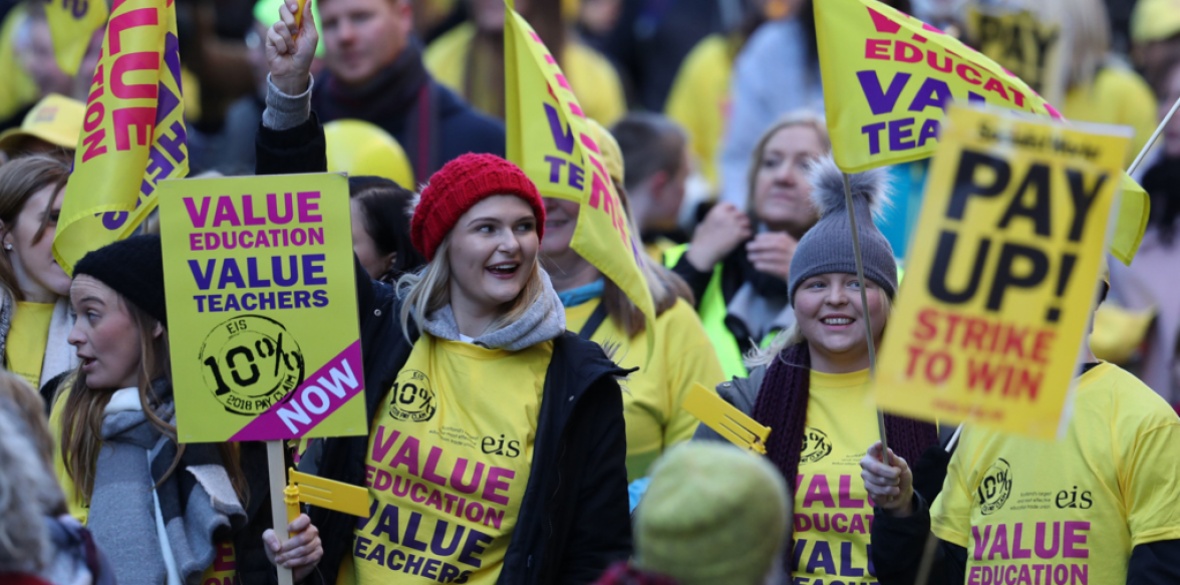This is the last article you can read this month
You can read more article this month
You can read more articles this month
Sorry your limit is up for this month
Reset on:
Please help support the Morning Star by subscribing here
THIS year sees the 50th anniversary of the first ever TUC equal pay conference. The conference was organised following the decision by the Gunter Inquiry to recommend to the Labour government that equal pay should be addressed by a voluntary rather than a legislative approach.
Fifty years on, it would appear that the SNP council in Glasgow would still prefer that equal pay be dealt with on a voluntary rather than a statutory basis and that governments see women as an easy industrial target.
Last week, over 8,000 low-paid women, members of Unison and the GMB employed by Glasgow City Council, went on strike, closing primary schools, libraries and affecting home care services, 18 months after the Court of Session ruled that the pay and benefits system implemented by the council in 2006 discriminated against female workers.
Around 12,000 women have legal claims lodged against the council that they were paid up to £3 an hour less than men doing similar work. In the 18 months since the council accepted the Court of Session judgement no claims have been paid and no timetable has been finalised for payment.
The comment that generated most frustration, and not a small amount of laughter, from the strikers was the statement that the council had explored all options to avert the strike. The response that the one option which had been ruled out was just paying their women workers the money that was owed to them was met by stony-faced silence.
Over 10,000 people marched in support of the women in Glasgow on Tuesday, but the support was not just limited to a vocal and financial nature.
Significant spontaneous industrial support for the strikers sprung up across the city, with cleaning and refuse workers, parking attendants and at least one teacher refusing to cross picket lines.
The immediate response from the SNP city council, which increased the level of anger among the workforce, was to threaten staff who were not on strike but refused to cross a picket line with disciplinary action.
The threat of disciplinary action against staff was quickly rescinded as the council saw the risk of the industrial action spreading to other groups of workers, but the city council, with almost Herculean ineptitude, dug their employment relations hole even bigger by writing to trade unions threatening them with legal action under Tory legislation on secondary action.
On the wider social front one of the most concerning developments from the dispute was the implication from the SNP leadership, at both a national and local level, that low-paid women while being the salt of the earth were not of course able to understand the complicated legal and industrial issues that were being played out and were being used by an anti-SNP trade union leadership.
First Minister Nicola Sturgeon said she had “nothing but admiration for the women involved” and SNP Glasgow City Council leader Susan Aitken said: “I understand why the women are angry” only to continue that “I’m not sure why this strike is taking place, I don’t believe the demands are strong enough to justify industrial action” and that the trade unions hadn’t given clear information to their members.
In just one sentence Aitken had managed to anger both the trade unions and the women workers in joint and separate ways by implying that their trade unions were manipulating them and that they were not in control of their own dispute or indeed their own future.
At almost the same time as the new jewel in the SNP local government crown was sending letters to trade unions threatening them with legal action, the Confederation of Scottish Local Authorities, which has the SNP as the largest political grouping on it, voted to go over the heads of the trade union movement by writing in conjunction with the Scottish government to individual schoolteachers extolling the virtues of Education Secretary John Swinney’s pay offer, even though teachers’ pay is set nationally.
Labour-led authorities such as North Ayrshire and North Lanarkshire said they would not be issuing such letters and the trade unions’ immediate reaction, as well as recommending rejection of the current teachers’ pay offer in a consultative ballot, was to turn out over 30,000 people to a demonstration in Glasgow.
With two in three Scottish secondary schoolteachers being women and the numbers increasing to 90 per cent in primary schools, it appears, whether by planning or incompetence, a previously sure-footed SNP leadership has made women its target in the year ahead.
At that 1968 TUC conference, women’s officer Ethel Chipchase told women delegates: “If you want revolution, you must do it yourselves.”
Last week, women trade unionists on picket lines and in rallies in Glasgow showed that they are quite willing to do it themselves, although, if John Swinney and the SNP leadership in local authorities continue in their aggressive posturing towards the trade unions and their members, that political revolution may soon encompass a significant number of men as well.









